Thinking about whether to neuter your puppy? Of course there are pros and cons to neutering, but, when you understand the issues, your decision will become easy.
Incidentally, male and female dogs are very different when it comes to neutering. But, your thoughts about whether to have your male dog castrated or your female dog spayed, will depend on whether you want to breed your Weimaraner or show her.
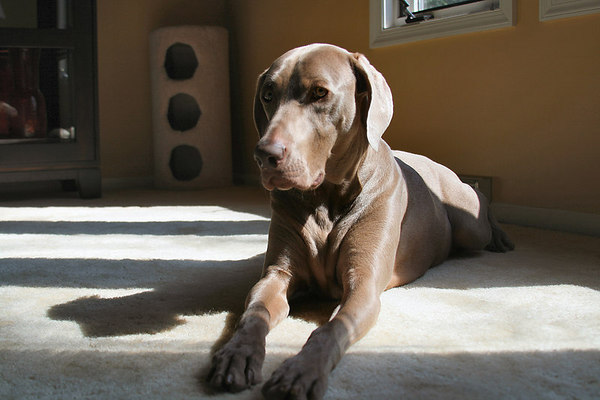
As you read this article, I will discuss:
- What is dog neutering?
- Why would you need to neuter your dog?
- Can you get an older dog neutered?
- Myths about dog neutering
- Taking care of your dog after neutering
- Signs of infection or complications
What is Dog Neutering?
When the vet neuters your male or female dog, she removes the possibility of mating and having puppies. Your dog will be sterile and cannot be bred. Dog owners decide to have this done for several reasons.
If your dog is male and he is neutered or castrated, his testicles are surgically removed. The scrotum is left intact.
However, there is now a non-surgical way to sterilize male dogs. There is a chemical, Neutersol, that is injected into the dog’s scrotum, with a small needle. This is considered to be pain-free.
While surgery reduces testosterone, the injection does not do this. This means that Neutersol may not eliminate or reduce male dog behaviors like urine marking, roaming or aggressive behavior.
If your dog is female, she could be sterilized by having her fallopian tubes tied off. Or she might be spayed or altered, which is the most common way of dog neutering for females.
Spaying is similar to a woman’s hysterectomy, the surgical removal of the uterus, fallopian tubes and ovaries.
Why would you need to neuter your dog?
A good question to ask is why have your dog go through this? If you are not planning to breed or show your Weimaraner puppy, there are some very good reasons to consider neutering.
The reasons differ for male and female dogs.
Male Dogs
Male dogs who have not been altered have a strong instinct to mark their territories, and that may include the inside of your home. Urinating on your furniture is not out of bounds.
Male Weimaraners also have a strong desire to find female dogs in heat. In fact, they have a tremendous ability to find a female in heat, who is quite a distance away.
To get to her, your male dog may dig holes under the fence, become more unmanageable and wander off to find the target of his affection.
And male dogs who have not been neutered do tend to be more aggressive and difficult to manage. Neutering may help calm down an aggressive male, but it is not a magical cure for aggression.
Medically, a male dog who has been castrated cannot get testicular cancer, and he will be less likely to get prostate diseases like an enlarged prostate.
Female Dogs
If your dog is female, your reasons for neutering will be different. Female Weimaraners have two estrus cycles each year. When your dog is in heat, she will have a bloody discharge, which can soil everything from carpeting to furniture. There are dog diapers available to take care of this issue, so it’s not the only thing to consider.
Female dogs get pregnant. Unless you are planning to breed your female, you probably don’t want to deal with a litter of puppies routinely.
Sometimes a female manages to breed with another dog, without your knowing it, and dogs are not particularly fussy about their sexual partners.
Aside from the obvious reasons above, there are medical reasons to neuter your female dog. When you remove the female reproductive organs, your dog cannot get cancers of the reproductive system. She will also avoid uterine infections like pyometra, which can be life threatening.
In addition, if your dog is spayed before her first birthday, she will be far less likely to get mammary or breast cancer.
Can you get an older dog neutered?
Some vets recommend neutering a dog as early as eight weeks of age. However, many vets are just not comfortable with performing surgery on such a young dog.
But what if your male dog was not neutered when still young? Or you got him from a rescue shelter? It’s still OK to have it done.
No matter how old your male dog is, when castrated, his behavior will improve. And research shows that you can still neuter a dog safely, up to 12 years old.
For female dogs, the story is a bit different. If you get your dog spayed before her first estrus, it reduces her chances of getting mammary or breast cancer to zero. Taking her reproductive organs removes the possibility of cancer in those organs, as well.
One very good reason to neuter your female is that unspayed females have a very high incidence of breast tumors.
You can still get protection from mammary cancer if you neuter your dog before her second, third or fourth heat. After that, though, the protection goes way down.
Myths about dog neutering

Because this is an important decision for you, we should talk about some of the myths or false information that circulates about neutering dogs.
These things are NOT true:
- Sexual experience is important for dogs because they will be more emotionally stable – Sex does not affect your dog’s temperament or mental health.
- Neutered dogs won’t hunt well anymore – The truth is that your hunting dog will hunt the same as always. His hunting instincts remain the same.
- If your dog is neutered, she will no longer be a watchdog – Your dog will still alert you to strangers and intruders.
- Your dog will now get fat – It is true that a neutered dog can gain weight more easily than one who is not. But, you can easily keep weight gain in check by feeding your dog a good diet and making sure she gets exercise every day. A neutered male dog will require 10% less food than before his surgery.
- Your female dog will be happier if she has one litter – This is a people thought. Dogs really don’t care. The sexual instinct in dogs is not emotional. It is an instinct, just like hunger for food or thirst for water.
How will it Change Your Dog?
Of course it is true that your dog will see some changes if he or she is neutered. These changes are different for male and female dogs.
If your dog is aggressive and having behavioral problems, you really should consider neutering him.
Changes in Male Dogs
There is some controversy over when to alter a male dog. Some vets think that castrating a male dog before puberty will prevent him from fully developing his male characteristics, while others just recommend doing it around 6 months old.
If you have your male dog neutered, you can expect to see these changes:
- Your dog will be less aggressive toward other males and less territorial.
- At the same time, other dogs will find your dog less competitive and will be less aggressive toward your dog. This is because your dog will not give off the same level of male hormones and scents.
- Fewer episodes of mounting your guests. Your guests will thank you.
- Urine marking in the house should stop or be less frequent.
- Your dog will be less dominant and easier to train
- He may not run away or roam
Changes in Female Dogs
The thinking on timing a female dog’s spaying has changed. We used to think that you needed to wait until after the first estrus cycle. But that is no longer the case. In fact, neutering a female dog before her first estrus is actually safer.
Female dogs also see changes after spaying.
- Personality changes – more mellow and settled
- Your dog may be more hungry, and she may gain weight
- If you have an alpha female, she may become even more aggressive than before. This is because she no longer has progesterone in her system.
- Your female dog may be easier to train. She may obey your commands better.
Taking Care of Your Dog after Neutering
The Surgery
When a dog is neutered, he or she undergoes major surgery. They receive anesthesia and they are unconscious during the surgery.
Just like surgery for you, your dog will be quite groggy for awhile, and she will need some TLC while she recovers during the next few days.
Tips for bringing your dog home after surgery
When you first bring your dog home, she will be sleepy and perhaps off balance. This will last about 18-24 hours.
There are some things that you can do to keep her safe.
- At least for the first night, confine your dog to her crate or to a small room.
- Don’t let your dog have access to steps, even if she normally negotiates them well. She may have balance issues for a few hours.
- Help your dog in and out of the car. You will need to pick your Weimaraner up so she doesn’t jump and pop her stitches. Lift your dog by wrapping your arms around your dog’s chest and front legs and rear and back legs, to support both ends but not hurt the surgical incision.
- Your dog will be sleepy for the next day. This is normal, and it’s OK to just let her sleep.
- For your safety and the safety of any children, do give your dog a wide berth. He may be a little grumpy or aggressive, and if handled, your dog may scratch or bite someone. It’s best to just leave him alone.
Care of the Incision
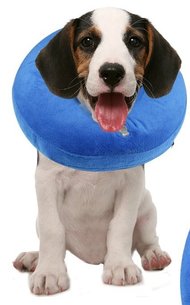
You will not have to clean or put anything on the surgical incision. Your dog’s stitches are probably inside, where you cannot see them.
The outside most likely will be glued together.
- To protect the incision, prevent your dog from jumping and keep his general activity to a minimum. Walking on a leash is a good exercise activity.
- Don’t let your dog lick or bite his incision. Licking or biting can re-open the incision and cause infection. There are two ways that you can do this. The first is a collar that stops your dog from being able to reach his incision.
- For example the MIDOG collar (picture to the right–also available in rose color) is soft and inflatable. I like this design better than the older Elizabethan collars that were large and bumped into everything when you dog moved around.
- You can also use a product like Bitter Apple Spray. Dogs don’t like the taste or smell of bitter apple, and they will not lick or bite the skin area where the spray or gel is applied.
Other Post-Surgical Care for Your Dog
After a neutering operation, your dog will take 7-10 days to heal. Healing time depends on your dog’s general health and how old he is.
Here are some things you can do to make sure his healing progresses well:
- Keep your dog’s activity level low. No playing with other dogs or romping around the yard. During the healing time, keep your dog on a leash.
- Unless your dog is outside to potty, keep her indoors. Make sure your dog’s bed areas are clean, dry and warm.
- No swimming and no baths.
- No grooming. Don’t have your dog groomed until he has completely healed.
Signs of Infection or Complications
Dog neutering is normally a very safe surgical procedure. However, with any operation, there is always the possibility of complications or infection. Knowing what to look for will help you decide if things are normal or you need to call your vet.
When you bring your dog home, look at his incision. You’ll probably see a small amount of redness and swelling, but no drainage. This is normal after surgery and this is how the incision should look, as it heals.
Within a few days, the slight swelling and redness will disappear.
If you see these symptoms, you should consider taking your dog to your vet:
- Discharge from the surgical incision
- Blood coming from the incision or you can see that the incision has broken open
- Increased swelling and redness
- Refusal to eat or to drink water
- Fever of 102 degrees F –
- Lethargy or lack of energy for more than 24 hours
- Labored breathing
- Painful urination or trouble urinating
- Diarrhea
- Vomiting
The overall benefits of neutering a dog who will not be shown or bred, far outweigh the negatives.
In general, if you neuter your dog, he or she will be healthier and nicer to have around.
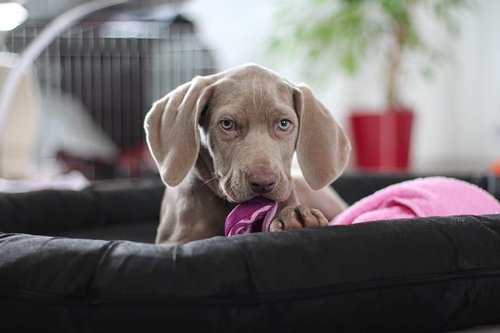
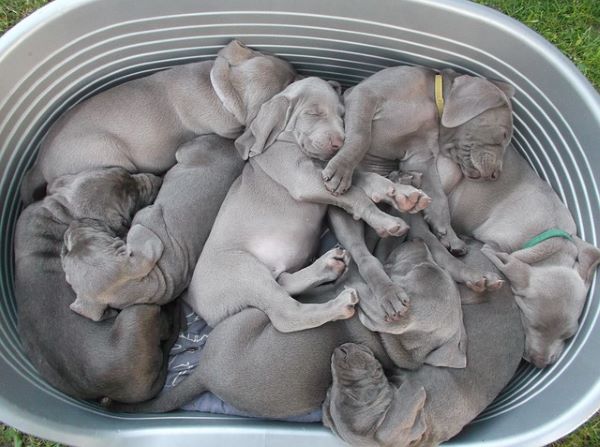


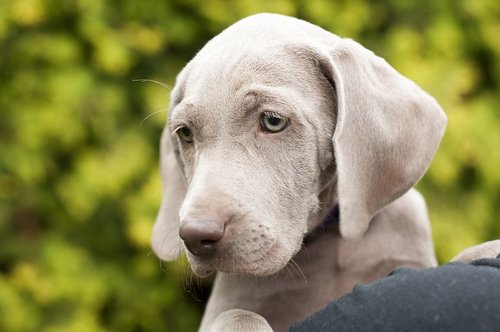
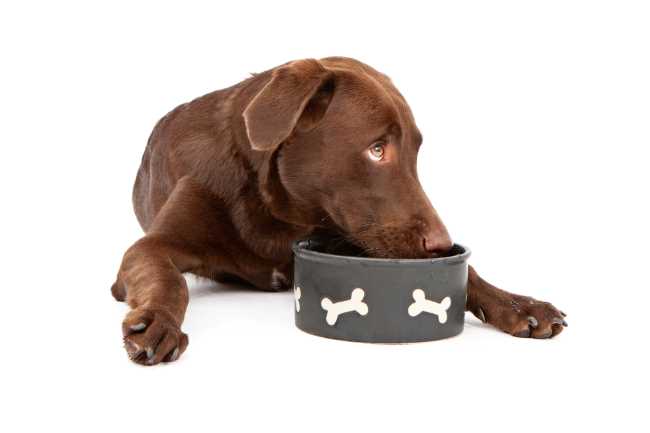
Leave a Reply